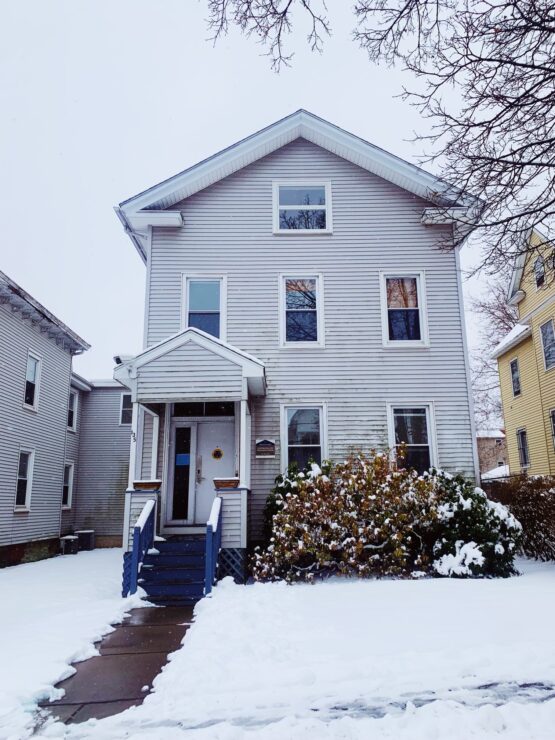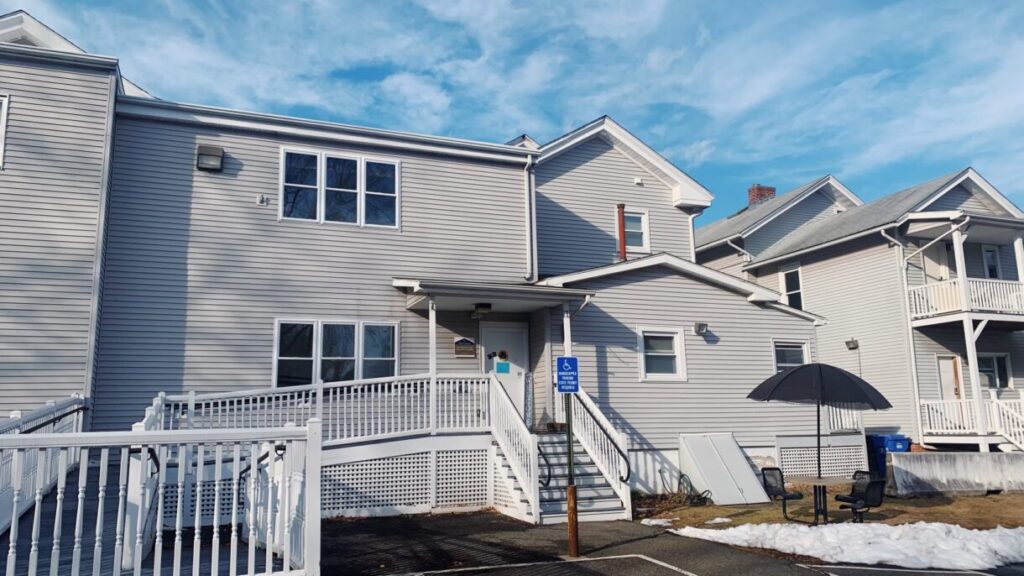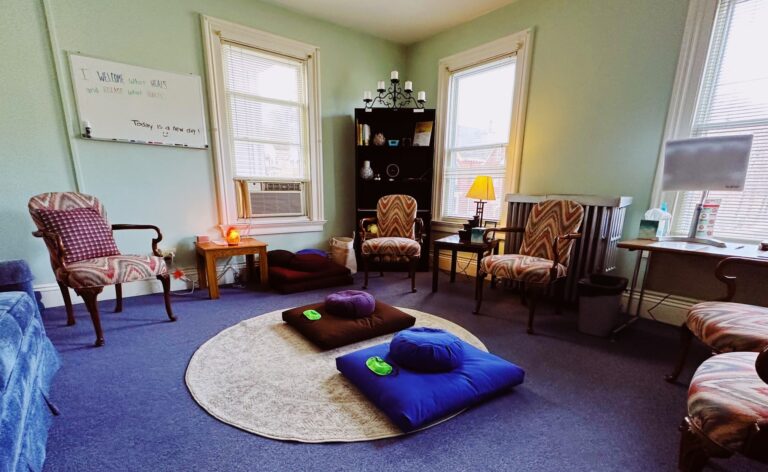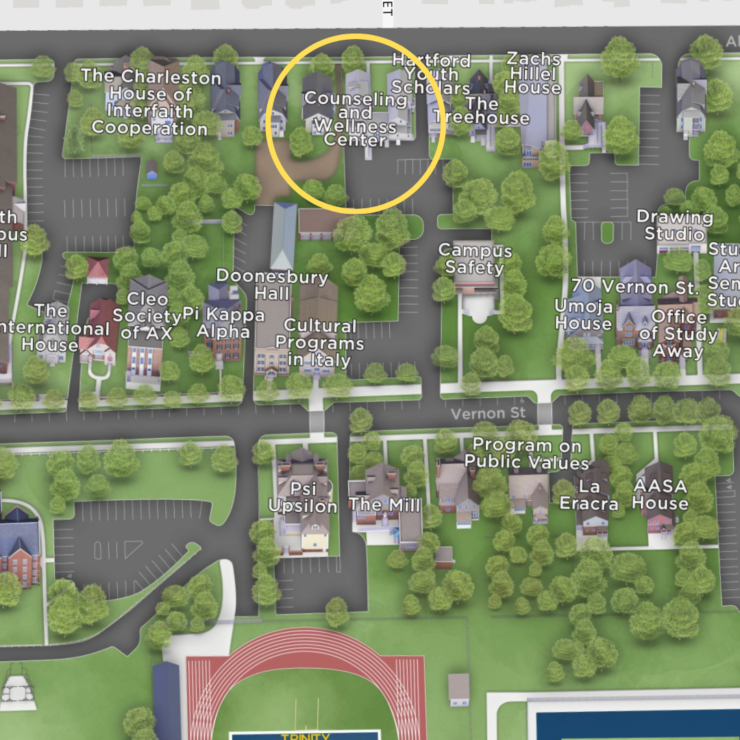Q&A with Trinity Counseling and Wellness Center Director Haben Abraham ’10
After growing up in Hartford and earning a bachelor’s degree at Trinity College, Haben Abraham ’10, LCSW, has a special connection to the community. She returned to campus in spring 2022 as a therapist at the Trinity Counseling and Wellness Center and became the center’s director last summer, stepping into the role after the retirement of longtime director Randolph M. Lee ’66, associate professor of psychology, emeritus.

“I’m grateful for the opportunity to expand the discourse around mental health and the important aspect of mental health maintenance,” Abraham said. “In coming back to Trinity and serving in this capacity, I’d like to help students build their own wellness practice.”
Abraham, who majored in global studies and minored in community action and Spanish as an undergraduate, holds a master’s in social work from Columbia University and specializes in treating anxiety and depression. “I’m working to dismantle the myths around mental health and this crisis narrative that sometimes can feel more intensified because of social media,” they said. “We have to be in tune with this generation, how they’re being fed information, and where to step in in those gaps.”
Read more from Abraham:
What first brought you to Trinity as a student?

I applied to Trinity Early Decision. Growing up in Hartford, I had positive memories and experiences at the College. One of the things that really impacted my decision to attend Trinity as a first-generation college student was a weekend for accepted students to come to campus. I saw the type of students that were here and the community I could see myself fitting into. Global studies supported my passion for social justice, and that connected to the community action minor, where my track was arts and activism. My interest in wellness and mental health, in general, also became part of my global studies major.
What were some of your most memorable experiences as a Trinity student?
Studying abroad was one of the most pivotal moments in my life. In my junior year, I went to Uruguay, Chile, and Trinidad. The experience informed the type of person and scholar I wanted to be and how I wanted to pursue purpose. There was an element of wellness and mental health that came out of my study abroad. Trinity set a fire in me; something was ignited. It solidified the direction I wanted to take my life.
At Trinity, I was part of the Trinity College Black Women’s Organization (TCBWO), Imani, the Multicultural Affairs Council, the Temple of Hip Hop, the Trinity College Gospel Choir, and P.R.I.D.E. I thank Trinity for the level of student engagement and critical thinking that I experienced. The type of discussions we were having was very empowering for me as a student, and I can see how that routed me toward mental wellness.
Why did you return to Trinity’s campus as part of the Counseling and Wellness Center?

During the COVID-19 pandemic, and at a time when there were some social justice and world events happening as well, I reflected on where I thought I was needed most in this moment. Collegiate mental health was an area I knew and was learning would be heavily impacted, especially given how social isolation, grief, and loss would impact development for students. I wanted to return to Trinity and saw there was a therapist position open. It happened to be the right timing, with the right skill set, and a need to redirect my purpose.
Why do you think your role is important to the College community?
I don’t do this work of overseeing mental health and wellness operations on campus alone; I have a great team, with several licensed clinic social workers (LCSWs), doctors of psychology (PsyDs), master’s of social work (MSW) interns, and an advanced practice registered nurse (APRN). It’s truly an opportunity to re-envision what wellness can look like on campus. We’re collaborating with folks to bring programming and workshops to campus, and we know that mental health and wellness doesn’t just happen at the center. There is still lingering stigma that exists around mental health. Being the first person of color in this role here, I think that representation matters for everyone, and breaking stigma serves everyone. It is important to me that I am a part of representing groups that may not have seen themselves at the center before. We’re reaching more people who weren’t accessing the center before.

What types of support can Trinity students seek at the Counseling and Wellness Center?
Students often come in looking for support around academic stress, and we do treat for depression and anxiety. We also provide a space for students having emergencies or crises. We offer walk-in hours and we always have on-call clinicians after hours. It’s important to note that these services are not just for students who are pre-existing clients. If a student is having an emergency and needs to talk to someone in the moment, that’s a service for everyone on campus.
What can students expect an interaction with your staff to be like?
We respect a student’s autonomy. We will lay out consent for services and walk them through what treatment options can look like, whether that may be individual or group therapy or workshops. Talk therapy is not for everyone, so we meet people where they are through the services we provide. The APRN can provide medication consultations. If a student needs more than what is at the center to address their mental health and wellness needs, we can make referrals off campus, which may include other services through Hartford Healthcare.
How does the center’s relationship with Hartford Healthcare benefit students?

My staff and I are HHC employees; our site is Trinity College. It’s made such an impact. With HHC, we get out ahead of a higher demand for mental health services. The partnership allows us to coordinate care for students using HHC staff beyond the center. We have increased our center’s visibility on campus, so I think in response to that, we have seen more utilization of the center. In times of increased demand, we can work with other HHC staff to see students as well. The Trinity College Health Center staff is also HHC, so our systems are able to interface to coordinate care. We’ve also increased the hours for our APRN because of HHC.
What advice do you have for the Trinity community about taking care of their mental health?
I would say, tap into the broader network of care that is on campus. The Counseling and Wellness Center is one piece of the puzzle. The network of care expands across different offices, and student organizations are a part of that as well. What matters here is everyone seeing themselves as part of that fabric and that we all play a role in the network of care. The more we normalize being part of a support network—which could be having a mentor or joining a student group—the more we serve students and the community as a whole in a more effective way.
The Trinity Counseling and Wellness Center provides mental health support, individual and group therapy, and resources to students. The CWC is located at 135 Allen Place, behind the Campus Safety building. For all inquiries and scheduling, call 860-297-2415 or email [email protected].
